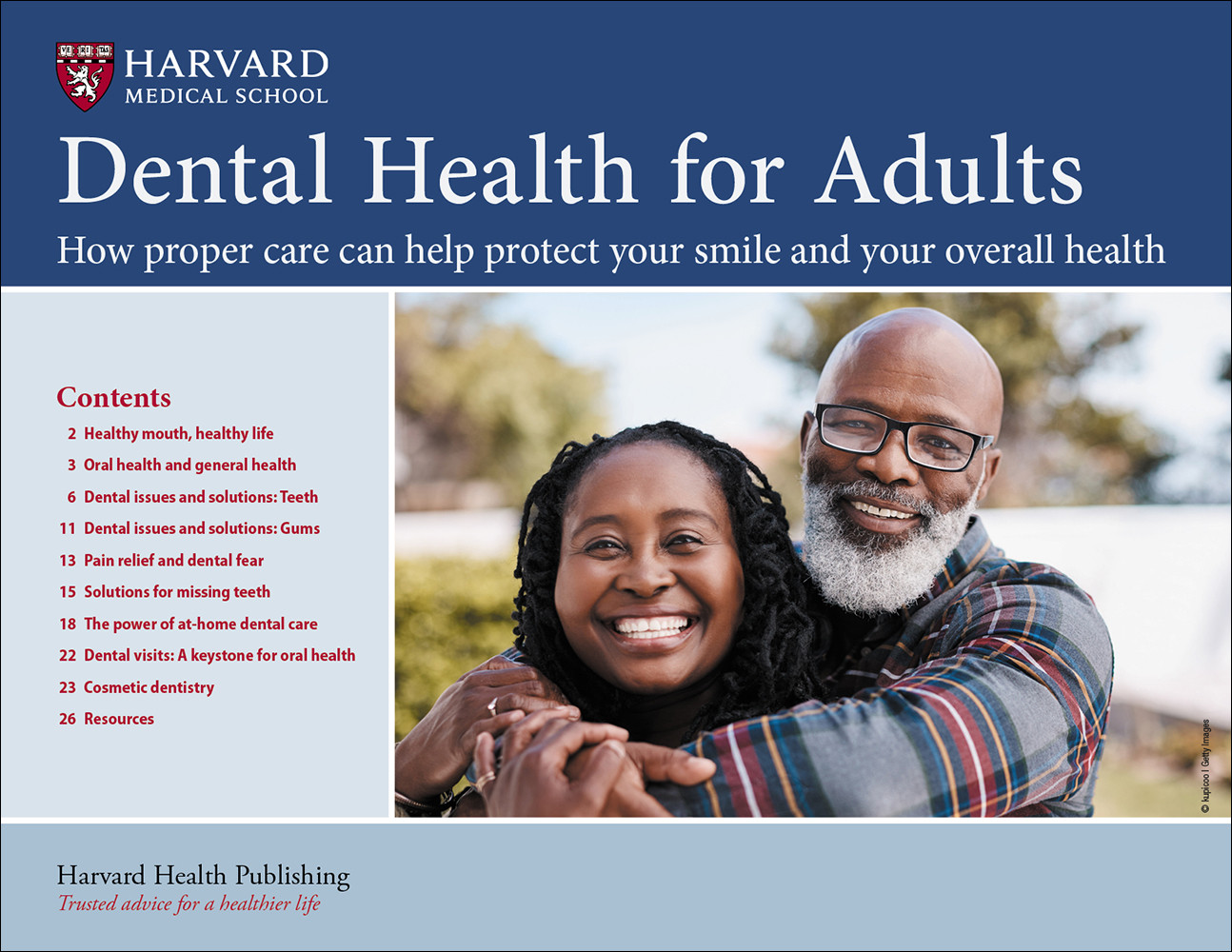3 common mouth problems and how to cope with them
Canker sores, dry mouth, and thrush can cause great discomfort.
- Reviewed by Anthony L. Komaroff, MD, Editor in Chief, Harvard Health Letter; Editorial Advisory Board Member, Harvard Health Publishing

Dental problems aren't the only source of a mouth full of pain. Sometimes, problems unrelated to the teeth make it difficult to eat, talk, smile, concentrate, or rest without discomfort. These conditions may have simple fixes you can try at home. If discomfort lasts or gets worse, you'll need to call your primary care doctor or an ear, nose, and throat specialist. Here are three common mouth problems and what you can do about them.
Canker sores
Canker sores (aphthous ulcers) are just a few millimeters wide, but they often cause severe pain. They develop in the lining of the mouth or gums, and they have a daunting appearance: round, white or yellow, and ringed with red. Canker sores may look like cancers of the mouth, but they are different.
"Canker sores don't invade the underlying tissue. That's what differentiates them from cancer," says Dr. Allen Feng, a head and neck surgeon and assistant professor of otolaryngology–head and neck surgery at Harvard Medical School.
Causes: There are many different causes of canker sores. These include a weakened immune system, stress, irritation from braces or dentures, biting your cheek by accident, over-vigorous teeth brushing, food allergies, or vitamin deficiency.
Treatment: To ease pain, Dr. Feng recommends taking over-the-counter painkillers, such as acetaminophen (Tylenol) or ibuprofen (Advil); swishing over-the-counter liquid antacids (such as Maalox) around the mouth; or rinsing with a prescription mouthwash that contains a numbing agent, such as lidocaine. To reduce further irritation, ice the canker sore before eating, avoid spicy or salty foods, and rinse your mouth with warm saltwater before and after meals. If what you think is a canker sore doesn't heal after two weeks, or if it gets bigger, see your doctor to make sure the sore isn't a sign of an autoimmune disease or a developing cancer. It's best to catch problems early. Precancerous ulcers are unusual, but when they occur, minor procedures can prevent them from progressing. For recurrent canker sores, some small studies have suggested that changing to a toothpaste that does contain sodium-laurel-sulfate may help reduce pain as well as the number and duration of aphthous ulcers.
Dry mouth
If you have a dry mouth once in a while, it may just be a sign that you need more fluids. But as we age, it's common to develop chronic dry mouth (xerostomia). "Dry mouth makes it hard to taste or eat. The lack of lubrication in the mouth can lead to problems chewing and swallowing," Dr. Feng says.
Causes: Chronic dry mouth can have many different causes. It could be an age-related decline in saliva production. Or it could be a side effect of medication; drugs that treat incontinence, depression, and allergies are common culprits. Other causes include autoimmune diseases, such as Sjögren's syndrome, or a side effect from treatment for cancer in the head or neck.
Treatment: Temporary fixes to ease discomfort from dry mouth include chewing sugar-free gum, which stimulates saliva production, and using a saliva substitute. Examples include glycerin-and-water mixes (Moi-Stir), carboxymethyl cellulose gels (Salivart), or mucopolysaccharide ointments (Mouth Kote).
For a severe case of dry mouth, your doctor might prescribe a medication such as pilocarpine (Salagen) or cevimeline (Evoxac). "But there's no magic fix for chronic dry mouth," Dr. Feng says. "You have to treat the underlying problem. So if it's caused by a medication side effect, talk to your doctor about switching to a different medication. If an autoimmune disease causes dry mouth, you need to start or alter your treatment."
Also: get enough fluids throughout the day, so you can produce enough saliva to coat your mouth. To find out how many ounces of fluids you need daily, divide your body weight (in pounds) by 3. A 150-pound person would need 50 ounces (about six cups) of fluids per day in beverages and food.
Thrush
Thrush is an overgrowth of the fungus Candida albicans. It shows up as white patches or sores on the tongue, cheeks, roof of the mouth, or throat. Thrush can make eating, swallowing, or speaking painful.
Causes:Candida albicans is naturally present in the mouth, but bacteria and a healthy immune system keep it under control. However, certain conditions, such as diabetes or AIDS, allow it to thrive, causing thrush. Taking antibiotics, getting cancer treatment, wearing dentures, smoking, having dry mouth, and using steroid inhalers can also lead to thrush.
Treatment: Thrush may resolve on its own after a few weeks. Until then, swishing over-the-counter liquid antacids in the mouth, rinsing with saltwater, or using prescription mouthwash with lidocaine may help ease discomfort. Brush your teeth regularly. If you wear dentures, remove and scrub them at night. Even better: Call your doctor for antifungal medication to treat thrush. "You should see improvement in a few days," Dr. Feng says, "and it's typically gone in a few weeks."
Image: © Ali Trisno Pranoto/Getty Images
About the Author

Heidi Godman, Executive Editor, Harvard Health Letter
About the Reviewer

Anthony L. Komaroff, MD, Editor in Chief, Harvard Health Letter; Editorial Advisory Board Member, Harvard Health Publishing
Disclaimer:
As a service to our readers, Harvard Health Publishing provides access to our library of archived content. Please note the date of last review or update on all articles.
No content on this site, regardless of date, should ever be used as a substitute for direct medical advice from your doctor or other qualified clinician.













